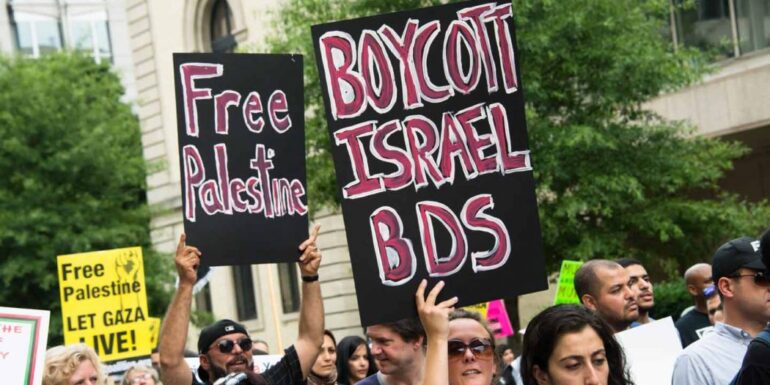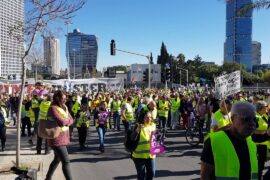American legislation targeting boycott, divestment and sanctions (BDS) initiatives against Israel took a hit on Wednesday when United States Senators Bernie Sanders (I-VT) and Dianne Feinstein (D-CA) publicly expressed their opposition to the “Israel Anti-Boycott Act.”
In a joint letter to US Senate Majority Leader Mitch McConnell (R-KY) and Minority Leader Chuck Schumer (D-NY), Sanders and Feinstein requested “that you not include the ‘Israel Anti-Boycott Act,’ (S. 720) in any year-end funding bill.”
“While we do not support the Boycott, Divestment and Sanctions (BDS) movement,” they continued. “We remain resolved to our constitutional oath to defend the rights of every American to express their views peacefully without fear of or actual punishment by the government.”
The legislation in question, sponsored by Senators Ben Cardin (D-MD) and Rob Portman (R-OH), seeks to punish individuals and organizations that participate in BDS activities.
In recent years, US-based pro-Israel organizations have focused their energies on combatting BDS campaigns, largely through political lobbying that frames BDS campaigns as a form of hate speech. As a result of these efforts, 26 American states have already passed local anti-BDS bills. But even if successful, top-down legislation completely misses the point and actually compounds the real threat posed to Jewish interests by BDS.
The problem with BDS is not that it endangers the State of Israel. It doesn’t. In fact, its impact on Israeli society might actually strengthen the Jewish state.
Tactics like BDS are generally effective when used against western societies that place the material wellbeing of the individual at the center. For such societies, the sense of isolation and monetary loss caused by boycotts, divestments and sanctions weaken the resolve of the targeted society and create sufficient pressures to ultimately change national policies.
But such tactics have a different impact on more eastern societies that prioritize the interests of the collective. Such societies become more cohesive and hardline in the face of isolating external pressures.
Israel is unique in that it possesses within it both western and eastern societies, often in conflict with one another.
The Liberal Zionist camp, erroneously referred to as “the left” in Israeli society, is actually a highly westernized ruling class largely disconnected from Jewish identity and aspirations while desperate for a sense of connection to the outside world.
What’s called “the right” generally refers to the more tribalist and traditionalist Israeli majority with a much deeper sense of Jewish national identity.
BDS initiatives simultaneously weaken the Liberal Zionists while strengthening Israel’s national camp, accelerating a process of political and social change already made inevitable by demographic trends. When understood within the context of Israeli society’s internal cultural war, BDS actually strengthens the forces of Jewish nationalism against those of western liberalism.
What’s most harmful about BDS is not its impact on Israel’s security or economy but rather the toxic rhetoric often accompanying it on campuses. BDS campaigns often create political climates that demonize Israel, socially isolate pro-Israel students and malign the notion of Jewish national identity. While many BDS activists might genuinely seek to combat injustice, their activism sometimes draws from classic anti-Semitic tropes.
Top-down anti-BDS legislation reinforces these anti-Jewish tropes by creating an image of powerful Jews using their political clout to silence criticism of Israeli policies.
While many pro-Israel Jews might really experience BDS campaigns as hate speech, most of their peers only hear criticism of a state’s actions and see Jewish organizations wielding influence to punish activists attempting to speak truth to power. It causes many Jewish students to avoid exploring their connection to Israel from fear of being caught on the wrong side of a polarizing conflict. So in addition to being superfluous, anti-BDS bills actually exacerbate the real dangers posed by BDS – not to the State of Israel but to the Jewish national consciousness of the next generation.
A more effective means of combatting BDS might be to initiate alternative boycotts targeting US companies profiting from our conflict. In essence, alternative boycotts would still pressure many of the same American businesses to change their policies in the Middle East. But rather than polarizing students and forcing them to choose sides in a fight between Israelis and Palestinians, alternative boycotts would show that both peoples are actually victims of foreign actors who continue to reap material benefit from us killing one another.





